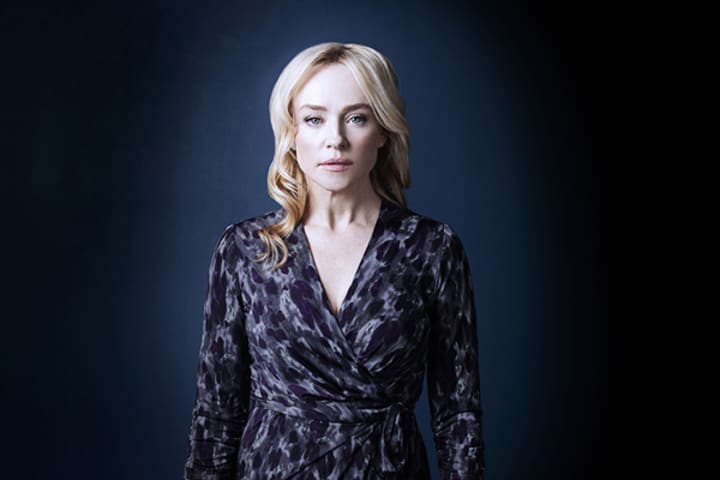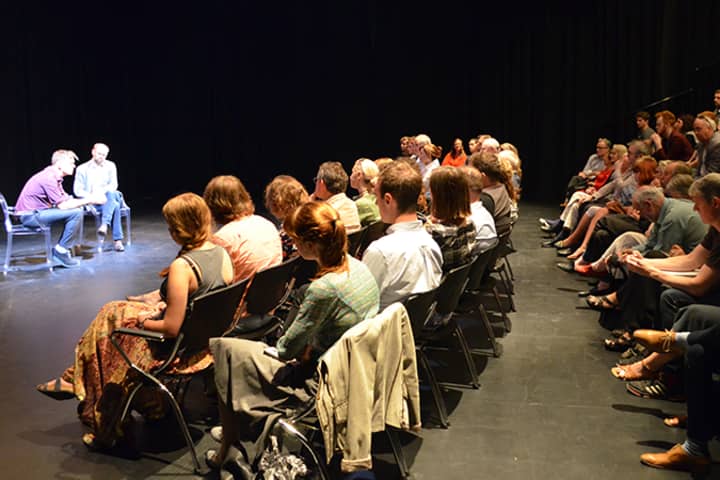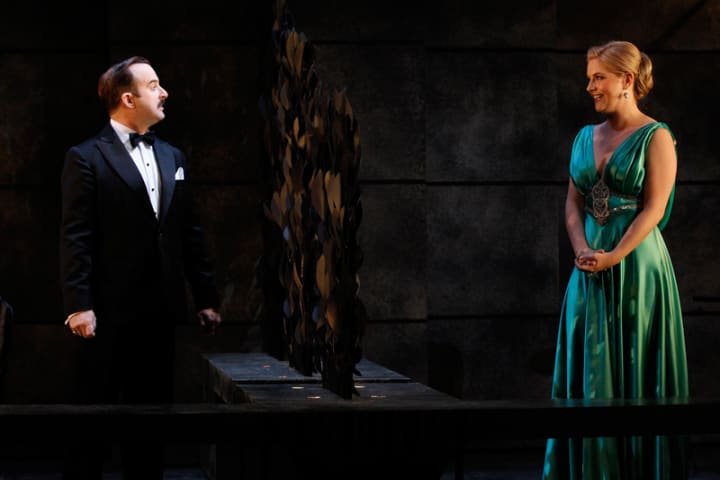Earlier this year MTC’s Paul Galloway spoke to Susie Porter about working on one of the toughest roles of her career.
Paul Galloway: I noticed to my surprise that Death in the Maiden will be your Melbourne stage debut.
Susie Porter: Yes, pretty amazing, isn’t it? I’ve never been on stage in Melbourne and this is the first time I’ll be working for MTC, after – what is it? – twenty years around the traps.
Though you were in the original season of Summer of the Seventeenth Doll at Belvoir, which came down to MTC but came without you.
Funnily enough, I was in Melbourne at the time MTC put it on, doing a tele-movie for the ABC. So I got a chance to see it. It was a weird experience to watch a play that I knew so well. It was Alison Whyte who played Olive, the role I played in Sydney, and Dan Whylie didn’t go down either. Travis McMahon stepped in for him. It was a strange experience because every actor is different and brings something new to a role. And the other actors react to the changes, so the production changed in all sorts of little ways. But for me the pleasure was that it was such a beautiful play and I just could sit back and enjoy it.
In my researches for this interview, I came across a quote in which you said: ‘I would love to play an obsessive character.’ Do you remember saying that?
Yes. (laughs)
Then I think you have your wish with Paulina in Death and the Maiden.
Yes, some would say obsessive, but to my mind everything that drives Paulina is perfectly feasible and well within what’s reasonable, considering her history. Obviously, everyone will have their take on it, whether the doctor is the doctor she remembers or whether it’s a figment of her imagination leading her astray. For me, she’s someone who has just spent her life [since her torture] thinking about it, having her life consumed by it. I’d say she’s a sufferer of post-traumatic stress disorder. And this opportunity presents itself to her. So, if she’s obsessive, it’s in the sense of wanting to discover the truth and getting some justice. I think that’s what she’s obsessive about. But I think if what happened to her had happened to me, I’d be the same.
Did you know the play before you accepted the role?
I did actually. When my agent asked would I be willing to speak to Leticia to talk about the role, I emailed my agent straight back and said, ‘Absolutely!’ I knew it from drama school. I think the play was first put on in London at the Royal Court around 1991 or 2. I remember reading it in either my first or second year at NIDA, and I went, ‘Wow, this is a role!’ So Leticia said, ‘Death and the Maiden’ and I said ‘Yep, let’s have the meeting.’ Before I met with Leticia, I re-read it and it had the same effect twenty years later. It is a great story, based on real events. I suppose human rights violations like this are going on all around the world, but it is still shocking to me, when I read it I think, ‘My God these things actually happened to someone.’ That is what gives the play such high stakes throughout the whole hour and a half.
How does an actor with no experience of torture play a torture victim? Torture, I would think, is unimaginable. How do you get into her head?
Obviously, to truly know what it’s exactly like is impossible. To really know it, I would have to go mad, wouldn’t I? But I think I would have a great deal of empathy for anyone who has gone through that experience and, as an actor, I would try to discover how that reflects in their behaviour. Next week I am going to speak to a therapist who is a leader in post-traumatic stress disorder. I am interested in talking to him just as a way to find an entry into Paulina’s mind, into how she might react to such a horrible experience and how it might manifest in her life today. On top of that, it’s a matter of reading up on the Pinochet regime in Chile and that background.
So you have begun researching already?
Yes, but obviously with Google these days, you can access basic research really easily. But I’ve already been to the library and pulled out a couple of books. So far, my preparation has been a mixture of reading, googling, talking to this therapist next week (Though I don’t know whether Leticia believes the character has PTSD, but speaking to him won’t hurt). Then I have read and re-read the script and pulled that apart. I’ve been doing the last couple of months, trying to get the lines in my body. So, by the time I finish with the Melbourne season then the Sydney, I will have had a good nine months living with the role, getting into how that person might feel.
Do you normally do so much preliminary research?
Not as much, but I think the difference with this is that this really happened. I know that the play’s particular story is fictitious, but generally. Knowing that this really happened to people, I want to be as truthful and as honest as I can – and to honour that. Without being too wanky about it, you have to be. People lost their lives, they went through so much. I think it is important to you to honour the people who were victims. Also remember the situation is still happening in some parts of the world today. The story has a universal quality, it stands for the experience of many people around the world – women in particular. Also, I haven’t been on stage for three and a half years, so there’s also some healthy fear driving me. And it is a big piece.
Yes, it is a big piece. It’s a harrowing role and you are doing not one season but two. Is that daunting, spending months with this distressed character?
It is a daunting. I have never done such a long run, so it will be an endurance test as well. But hopefully it will be okay.
Oh, look, you sound mentally balanced to me. I don’t think it is going to send you over the edge. But it is a long slog. It will be mentally exhausting, I expect.
It is a long slog and I was approached to do another play straight after, crossing over with rehearsals while this play was still running. And I said to them, “Look, I can’t. Not after five months of this.’
Looking at your CV in front of me, it is unusual in how little theatre you have done over the years. You have been almost fully employed in films and TV.
Look when the right play comes up, then I’ll do it. But then for me it always has to be the right play and if I believe in it. And I suppose in the last few years, I did That Face at Company B and Summer of the Seventeen Doll and now this. And all of them were plays where I felt excited and that I had to do them.
You are in the enviable position, since you have done such good high profile TV and film work, that you can pick and choose.
Yes, I suppose I’m in that position. But I haven’t actually been offered much theatre in the past three years. Though it’s interesting that, since I said yes to Death and the Maiden, I’ve had a lot more theatre offers. Otherwise, if I love the play, then sometimes it feels as if the choice is taken away from me, because I know I have to do it. Also as an actor, stage helps you get your craft back. Obviously, I trained at NIDA doing theatre, but you can’t be lazy in the theatre. You have to have your wits about you. There’s also been a sense that I haven’t been scared for a while. You need to be challenged. As much as something on TV such as Puberty Blues was such a brilliant job and gave me a chance to go on set and laugh with Dan Whylie, it doesn’t challenge you so much, as an actor. Because there isn’t a sustained effort. In theatre you have preparation before rehearsals and then there are so many ups and downs during the rehearsal process, then bumping in, and previews, then Opening Night. It is such a full on ride, then once the season settles in there is another discipline that kicks in. So you get tested on all fronts. I just have to do it a day at a time and front up to it.
That’s why getting prepared as much as I can is so important. So that in rehearsals I’m not rushing home, reading up, cramming all the lines. I want the lines to be – well not down – but very familiar by the time rehearsals start. So that will keep the fear in healthy limits.
You’ve mentioned fear a few times now already. The show is not giving you sleepless nights, is it?
No! Not sleepless nights. But I think it is good to have that, a little anxious whether you are being honest and true and real and the best you can be and I bet the other actors are feeling the same way.
Susie Porter stars in Death and the Maiden, playing from 18 July to 22 August at Southbank Theatre, the Sumner.
Published on 2 July 2015





